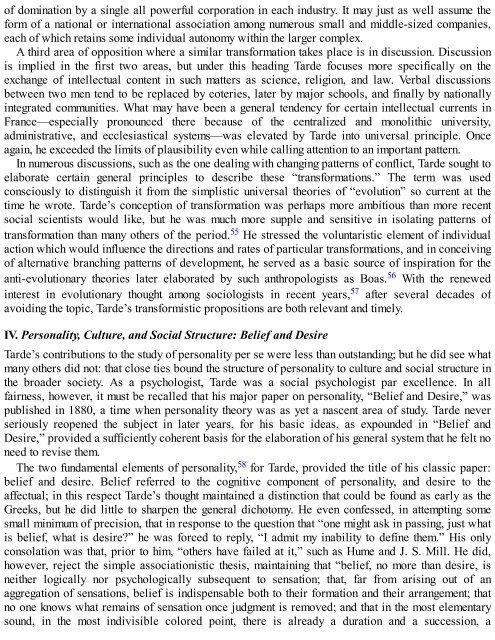3658925934
You also want an ePaper? Increase the reach of your titles
YUMPU automatically turns print PDFs into web optimized ePapers that Google loves.
of domination by a single all powerful corporation in each industry. It may just as well assume the<br />
form of a national or international association among numerous small and middle-sized companies,<br />
each of which retains some individual autonomy within the larger complex.<br />
A third area of opposition where a similar transformation takes place is in discussion. Discussion<br />
is implied in the first two areas, but under this heading Tarde focuses more specifically on the<br />
exchange of intellectual content in such matters as science, religion, and law. Verbal discussions<br />
between two men tend to be replaced by coteries, later by major schools, and finally by nationally<br />
integrated communities. What may have been a general tendency for certain intellectual currents in<br />
France—especially pronounced there because of the centralized and monolithic university,<br />
administrative, and ecclesiastical systems—was elevated by Tarde into universal principle. Once<br />
again, he exceeded the limits of plausibility even while calling attention to an important pattern.<br />
In numerous discussions, such as the one dealing with changing patterns of conflict, Tarde sought to<br />
elaborate certain general principles to describe these “transformations.” The term was used<br />
consciously to distinguish it from the simplistic universal theories of “evolution” so current at the<br />
time he wrote. Tarde’s conception of transformation was perhaps more ambitious than more recent<br />
social scientists would like, but he was much more supple and sensitive in isolating patterns of<br />
transformation than many others of the period. 55 He stressed the voluntaristic element of individual<br />
action which would influence the directions and rates of particular transformations, and in conceiving<br />
of alternative branching patterns of development, he served as a basic source of inspiration for the<br />
anti-evolutionary theories later elaborated by such anthropologists as Boas. 56 With the renewed<br />
interest in evolutionary thought among sociologists in recent years, 57 after several decades of<br />
avoiding the topic, Tarde’s transformistic propositions are both relevant and timely.<br />
IV. Personality, Culture, and Social Structure: Belief and Desire<br />
Tarde’s contributions to the study of personality per se were less than outstanding; but he did see what<br />
many others did not: that close ties bound the structure of personality to culture and social structure in<br />
the broader society. As a psychologist, Tarde was a social psychologist par excellence. In all<br />
fairness, however, it must be recalled that his major paper on personality, “Belief and Desire,” was<br />
published in 1880, a time when personality theory was as yet a nascent area of study. Tarde never<br />
seriously reopened the subject in later years, for his basic ideas, as expounded in “Belief and<br />
Desire,” provided a sufficiently coherent basis for the elaboration of his general system that he felt no<br />
need to revise them.<br />
The two fundamental elements of personality, 58 for Tarde, provided the title of his classic paper:<br />
belief and desire. Belief referred to the cognitive component of personality, and desire to the<br />
affectual; in this respect Tarde’s thought maintained a distinction that could be found as early as the<br />
Greeks, but he did little to sharpen the general dichotomy. He even confessed, in attempting some<br />
small minimum of precision, that in response to the question that “one might ask in passing, just what<br />
is belief, what is desire?” he was forced to reply, “I admit my inability to define them.” His only<br />
consolation was that, prior to him, “others have failed at it,” such as Hume and J. S. Mill. He did,<br />
however, reject the simple associationistic thesis, maintaining that “belief, no more than desire, is<br />
neither logically nor psychologically subsequent to sensation; that, far from arising out of an<br />
aggregation of sensations, belief is indispensable both to their formation and their arrangement; that<br />
no one knows what remains of sensation once judgment is removed; and that in the most elementary<br />
sound, in the most indivisible colored point, there is already a duration and a succession, a









![Genki - An Integrated Course in Elementary Japanese II [Second Edition] (2011), WITH PDF BOOKMARKS!](https://img.yumpu.com/58322134/1/180x260/genki-an-integrated-course-in-elementary-japanese-ii-second-edition-2011-with-pdf-bookmarks.jpg?quality=85)
![Genki - An Integrated Course in Elementary Japanese I [Second Edition] (2011), WITH PDF BOOKMARKS!](https://img.yumpu.com/58322120/1/182x260/genki-an-integrated-course-in-elementary-japanese-i-second-edition-2011-with-pdf-bookmarks.jpg?quality=85)





